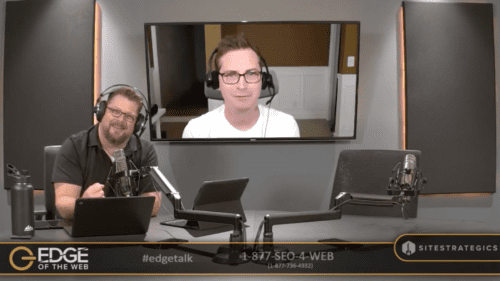Our special guest for episode 358 of the award-winning EDGE of the Web podcast was Greg Finn, Partner and Digital Marketer at Cypress North. Host Erin Sparks spoke with Greg about the digital marketing rollercoaster of Google’s many ups and downs. Here’s what we learned:
Greg Finn: His Background and Experience

Greg Finn is a Partner and Digital Marketer with Cypress North, a performance digital marketing and development firm in Buffalo, New York. He’s been managing digital marketing campaigns for more than a dozen years, is a Google AdWords Certified Partner, serves as a correspondent for both Search Engine Land and Marketing Land, and has been a speaker at some of the largest search engine conferences such as SMX, SocialPro, and Pubcon.
Like Site Strategics, Cypress North is all about results-based marketing. Specialty focus areas include B2B advertising, inbound marketing, lead gen, and of course Google Ads, which is a particular interest for Greg. Greg also has a great podcast called Marketing O’Clock, which is now under the umbrella for Search Engine Journal.
Greg specializes in paid ads because he loves the win-win matching game it facilitates between what a user is entering for a query into a search engine and then serving up a real solution to them that benefits them and benefits the client advertiser.
Google Partners: Shaping Digital Marketing Professionals
It’s amazing to think about what Google Ads as a platform used to be like ten years ago compared to what it is today. There’s so much functionality to it, which is why digital marketing professionals in agencies really need to receive some training on it and show some real proficiency in using it. Google has done an excellent job of reaching out to digital marketing professionals to both help them and reward them for acting as a liaison between Google and advertisers and essentially being stewards of those client ad budgets. In fact, Greg thinks it is the proactive partnership approach that played a major role in Google rising above all the other search engines.
It’s major channel for doing this is the Google Partners program within Google Ads. It’s a noble effort on Google’s party to help agencies do better for their clients through Google. Participating partners could receive various kinds of rewards for their participation, including coupons and discounts for their clients and all kinds of other interesting and fun rewards. An agency that enrolled in Google Partners and met its requirements as a Partner or Premier Partner would receive a badge they could put on their site, and back in the day Google even maintained an online listing of its partners. This was useful because advertisers new to Google Ads could see which agencies were certified partners and choose one near them to begin working with. It makes sense that Google would want to help match up advertisers with agencies who have been through Google’s rigorous training program to become Partners.
Changes to the Google Partners Program
The Google Partners program also provided an essential support channel for Partners when needed. Partners often had a Google account representative they could be in touch with when issues, challenges, and problems came up. And that account representative was really available and with you every step of the way. But then Google started having cold feet about the whole account rep approach. They seemed concerned that not all account reps were at the same level of skill, or might treat some Partners differently than other Partners, and so on. As a result, Google started rotating the account reps so a Partner didn’t always have the same one. But for Partners, having consistency with an account representative was a key advantage and feature of the program.
And an agency whose site carried that Google Partners badge was important to advertisers seeking agency services. Whether it should have or shouldn’t have, the badge carried weight because it implied a kind of endorsement from Google itself. In the earlier years of the program, this was important in helping Google gain its overwhelmingly deep grip on the search engine market and advertising in search.
As the unchallenged leader in the space, what has evolved more recently is a focus on very different kinds of metrics in the program. Now the points Partners accumulate toward rewards are based on metrics like “client upsell percentage” and “automated bidding percentage” and how much “smart creative” you’ve implemented. But what’s frustrating about that is how these new metrics aren’t based on getting results for the client!
From the Partner perspective, this all started out innocently enough with Google making suggestions and recommendations for what it thought a Partner should do to optimize campaigns, but it’s not optimization on behalf client results per se, but rather from Google’s perspective, which isn’t always the same. And then you start to hear about instances where Google is having contact directly with the advertising client and not the agency managing the campaigns. Google might highlight to client how certain how certain optimization metrics/tactics aren’t being utilized in their campaigns. This seems to place a wedge directly between an agency and it’s client.
An even more disturbing issue, getting back to those Google account reps, is how the reps aren’t paid based on getting results for the Partner or even the advertising client, but instead they are compensated based on how many new programs they can’t get clients to buy into. So there is this kind of incentive for the account reps to have that direct contact with clients and upsell them. And now Google is really pushing those new optimization metrics within the Partners program to force Partners to indirectly do that upselling for them in order to meet the metrics.
When Google started first pushing these recommendations it would make in the platform, Partners had the option to dismiss them if they didn’t want to follow them. Google might show a recommendation such as “increase your budget” but it could be dismissed without incurring any penalty to your recommendation score. In other words they didn’t interfere with the work of a Partner, and if a client wondered about why any specific recommendations weren’t followed, the Partner could easily explain to the client why following any particular recommendation wouldn’t be a good idea. After all, the Partner has to use their judgement on what recommendations to follow as the Partner pursues getting the intended results for their client. Google might make a recommendation that would result in highly distasteful marketing, and any number of these kinds of scenarios can and do happen. For a partner to just pursue a 100% recommendation score doesn’t necessarily match up to what is best for the advertising client.
Then at the end of February Google started announcing a number of changes to the Partners program. One was that the 90-day minimum ad spend was going to double from $10,000 to $20,000. This didn’t seem like a big deal. Partners should be operating at a serious level of ad spends. They also eliminated the tenure requirement of Partner status, which used to be perhaps a year in the program before achieving full Partner status. This doesn’t seem like a good move because you want Partners to have that depth of experience in the program. The third change was that any participating agency needed to have 50% of the users on its account certified by the program. This is not a bad move either. People working inside those accounts ought to be certified, at a minimum.
But then there is the final piece of the puzzle, which revolved around these optimization metrics scores. So this is the worst of the changes because now Partners would not be able to remove any of the recommendations Google makes, and the Partner’s recommendation score would now be calculated accounting for recommendations not implemented. In other words, Google is now saying you have to hit a certain level of what we tell you do, for YOUR client if you want to remain a Partner. This is a major conflict of interest! Google is making money off a Partner spending their client’s hard-earned money, and now Google is going to tell you (the Partner) how you have to spend your client’s money? That’s a huge conflict and major overreach.
What’s possible here now is a scenario where a Partner does things to meet the performance metrics as demanded by Google but it ends up hurting the client because the recommendation wasn’t good for the client’s specific needs and requirements. This makes no sense! Suddenly the Partners program shifts from being an effort to really help Partners and support them to one that basically says, you have to do what we tell you to do to remain a Partner. It’s just a bad idea. And if an agency is dismissed from the Partners program, how are those optics going to play for the agency? Obviously, not well at all. It’s going to negatively impact your brand, whether or not it should.
This is why Google is even taking away a lot of the account reps altogether, especially for smaller agencies. Why? Because Google really only cares about a handful of Partners, and now that they can just force Partners to implement their recommendations or kick them out of the program, they don’t need to bother with account reps for most Partners, because they don’t care about them.
Full implementation of these changes has been delayed because of the pandemic. But you still see the writing on the wall – Google is going to say to a Partner agency, you have to hit 70% of the recommendations they make. But Google, the company who sets the score requirement, is the company that profits off the Partner and their client hitting the score. Is it any wonder that a recommendation from Google will likely be “increase budget?” It’s a conflict of interest!
Savvy clients ought to see right through this and shouldn’t want to use a Partner agency because all they can do is what Google tells them, which may or may not be in that client’s interest! But for less savvy clients, they still want the supposed “endorsement” that comes by working with a Partner agency. Many won’t understand how it might not be in their interest to work with a Partner once these changes are fully implemented. Meanwhile, Google continues to take away support functions or outsource them to third-parties (even though they will say they’re Google, they’re not). It’s all part of an alarming trend of Google undermining agencies.
What Can We Do About All This?
As an agency, it’s easy to feel helpless in the face of all this because there’s literally nothing you can do about any of it. Sure, you can diversify your SEM to include alternatives to Google, but you certainly cannot ignore the biggest one out there. What Greg is doing at Cypress North is proactively letting clients know their commitment to the client means they will never implement a recommendation from Google that they don’t think is right for the client. If the agency loses its badge and Partner status, so be it. They will have their own badge, a new and better badge that isn’t a Google badge because it’ll be a CLIENT badge, because it’s the client and getting results for the client that matters. Greg is encouraging any digital marketing professional or agency to have real conversations with potential clients about what working on behalf of the client really means, and how it may or may not match up with Google recommendations. Greg is also encouraging agencies to boldly pledge and make it clear that they will not do what a platform tells them to do, they will do what’s best for the client and what will get the intended results. It’s just a simple way to fight back and turn a sour situation into a positive, which is client-centricity. Here’s the link to become a Client Partner: https://client.partners.
Connect with Greg Finn and Cypress North
Twitter: @gregfinn (https://twitter.com/gregfinn)
LinkedIn: https://www.linkedin.com/in/gregfinn
Podcast: Marketing O’Clock (https://marketingoclock.com)
Website: https://cypressnorth.com
CN Twitter: @Cypress North (https://twitter.com/cypressnorth)
CN YouTube: https://www.youtube.com/channel/UCxm5P0CGF5510aYO3_fGesw
Digital Marketing ROI: Need a Checkup?
Find out how healthy your digital marketing ROI is with a Site Strategics report examining your SEO, content, social media, and PPC. Visit https://edgeofthewebradio.com/roi to get 30% off a comprehensive review of your digital assets!


